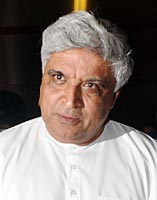 | « Back to article | Print this article |
 Lyricists and music composers working in the film industry have voiced their displeasure at the ruling of the Mumbai High Court last week regarding the royalty issue.
Lyricists and music composers working in the film industry have voiced their displeasure at the ruling of the Mumbai High Court last week regarding the royalty issue.
To raise the issue leading music composers and lyricists like Javed Akhtar, Anand of Kalyan-Anand, Vishal Bhardwaj, Ram Sampath, Loy Mendonsa, Sameer, Sulaiman Merchant and Lalit Pandit came together to collectively issue a statement at Time and Again restaurant in Versova, Mumbai.
The court ruled that the Indian Performing Right Society Limited (IPRS) -- that safeguards the copyright of music composers and lyricists -- is not entitled to claim or demand royalty or licence fees from FM Radio channels for the songs and music they broadcast.
This means that the FM stations will now have to deal only with Phonographic Performances Limited to obtain a licence to play the music.
Music Broadcast Private Limited (MBPL), that runs 26 radio stations in the country, had moved the High Court in 2006 stating it has been paying royalty to IPRS and now wants to stop doing so because it is already paying a licence fee to PPL.
What this means in essence is that the radio industry claims that the actual ownership of the music that they play, and all the rights, belong to music labels or the producers of the film. Music composers and lyricists have no copyright.
Lyricist Javed Akhtar explained, "I don't know how the case was fought, what were the arguments that went in, but the judge said only the record company should get the royalty. The royalty doesn't come to the writer and the composer alone, the producer and music company also claim their share. So, according to this verdict, not only will we make a loss, but the producers and the music company are partially affected too."
Akhtar is annoyed at what he sees as the hypocrisy of the radio companies. "The radio fraternity has throughout been telling us that they would love to pay royalty to composers and lyricists. But now it is revealed that the stand taken by them in the court is exactly the opposite. This is indeed like stabbing us."
Akhtar also stated that the verdict appears to be contradictory to the provisions of the Indian Copyright Act and is also incompatible and in gross violation of India's obligations under international treaties like TRIPS (trade related intellectual property rights)
He added, "If India does not recognise the right of composers and songwriters it could well face an international backlash since copyright is no more a local matter. It has become an international issue."
Filmmaker and music composer, Vishal Bhardwaj said that an amendment was very much needed to the Copyright Act. "This only goes to show how vulnerable the community of composers and lyricists is. It is high time that Parliament got the proposed amendments to the Copyright Act passed. I think that is the only way to protect artists in this country.
"What the court is saying is that IPRS doesn't exist! According to this rule, if a Bryan Adams song is played here in India, he won't get money for that because our country doesn't agree that there is any such copyright."
Ram Sampath, who had earlier filed a case of copyright infringement against Rakesh Roshan as he was not given due credit for Krazzy 4's music, voiced his concern by drawing differences between the corporate and the film world. "It is sad and worrying that while the corporate world recognises the IPR (intellectual property rights) of the composer or songwriter, the film world just doesn't seem to be bothered. And now this judgement will mean death for Indian music."
Sampath, who composed the music of the recent hit Delhi Belly said, "I compose music for a lot of advertisements and I have contracts with a lot of big companies. I have never faced a problem with them. When will the music industry realise the importance of the current situation?"
He said it's a very "frightening situation because it's only the royalty we count on. The music industry has completely changed, people now believe in buying and consuming music digitally. If we have no stake in our music, then we won't have anything left."
Veteran music director Ravi Shankar Sharma, who had sued the producers of Slumdog Millionaire for using his song Darshan Do in the movie, said, "My song was used in the movie Slumdog Millionaire for which I took them to court. The producer paid Rs 20 lakh to me. So there is no way one can consider that music and lyrics have no copyright."